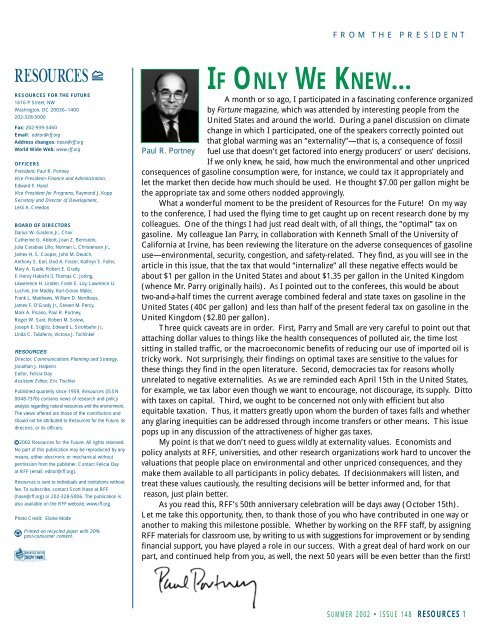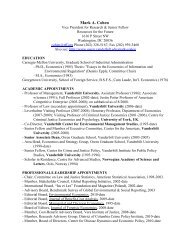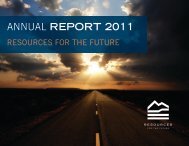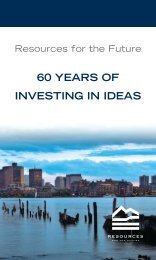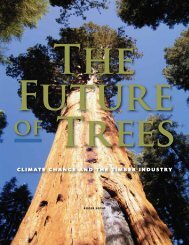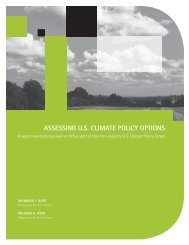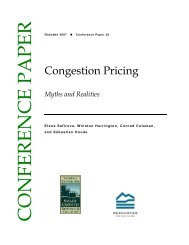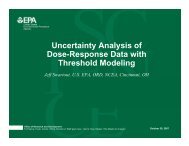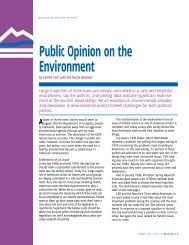Resources: Summer 2002; Issue 148 - Resources for the Future
Resources: Summer 2002; Issue 148 - Resources for the Future
Resources: Summer 2002; Issue 148 - Resources for the Future
Create successful ePaper yourself
Turn your PDF publications into a flip-book with our unique Google optimized e-Paper software.
FROM THE PRESIDENT<br />
RESOURCES FOR THE FUTURE<br />
1616 P Street, NW<br />
Washington, DC 20036–1400<br />
202-328-5000<br />
Fax: 202-939-3460<br />
Email: editor@rff.org<br />
Address changes: hase@rff.org<br />
World Wide Web: www.rff.org<br />
OFFICERS<br />
President, Paul R. Portney<br />
Vice President–Finance and Administration,<br />
Edward F. Hand<br />
Vice President <strong>for</strong> Programs, Raymond J. Kopp<br />
Secretary and Director of Development,<br />
Lesli A. Creedon<br />
BOARD OF DIRECTORS<br />
Darius W. Gaskins Jr., Chair<br />
Ca<strong>the</strong>rine G. Abbott, Joan Z. Bernstein,<br />
Julia Carabias Lillo, Norman L. Christensen Jr.,<br />
James H. S. Cooper, John M. Deutch,<br />
Anthony S. Earl, Dod A. Fraser, Kathryn S. Fuller,<br />
Mary A. Gade, Robert E. Grady,<br />
F. Henry Habicht II, Thomas C. Jorling,<br />
Lawerence H. Linden, Frank E. Loy, Lawrence U.<br />
Luchini, Jim Maddy, Karl-Göran Mäler,<br />
Frank L. Mat<strong>the</strong>ws, William D. Nordhaus,<br />
James F. O’Grady Jr., Steven M. Percy,<br />
Mark A. Pisano, Paul R. Portney,<br />
Roger W. Sant, Robert M. Solow,<br />
Joseph E. Stiglitz, Edward L. Strohbehn Jr.,<br />
Linda C. Taliaferro, Victoria J. Tschinkel<br />
RESOURCES<br />
Director, Communications Planning and Strategy,<br />
Jonathan J. Halperin<br />
Editor, Felicia Day<br />
Assistant Editor, Eric Tischler<br />
Published quarterly since 1959, <strong>Resources</strong> (ISSN<br />
0048-7376) contains news of research and policy<br />
analysis regarding natural resources and <strong>the</strong> environment.<br />
The views offered are those of <strong>the</strong> contributors and<br />
should not be attributed to <strong>Resources</strong> <strong>for</strong> <strong>the</strong> <strong>Future</strong>, its<br />
directors, or its officers.<br />
c <strong>2002</strong> <strong>Resources</strong> <strong>for</strong> <strong>the</strong> <strong>Future</strong>. All rights reserved.<br />
No part of this publication may be reproduced by any<br />
means, ei<strong>the</strong>r electronic or mechanical without<br />
permission from <strong>the</strong> publisher. Contact Felicia Day<br />
at RFF (email: editor@rff.org).<br />
<strong>Resources</strong> is sent to individuals and institutions without<br />
fee. To subscribe, contact Scott Hase at RFF<br />
(hase@rff.org) or 202-328-5006. The publication is<br />
also available on <strong>the</strong> RFF website, www.rff.org.<br />
Photo Credit: Elaine Mode<br />
Printed on recycled paper with 20%<br />
post-consumer content.<br />
IF ONLY WE KNEW…<br />
A month or so ago, I participated in a fascinating conference organized<br />
by Fortune magazine, which was attended by interesting people from <strong>the</strong><br />
United States and around <strong>the</strong> world. During a panel discussion on climate<br />
change in which I participated, one of <strong>the</strong> speakers correctly pointed out<br />
that global warming was an “externality”—that is, a consequence of fossil<br />
Paul R. Portney fuel use that doesn’t get factored into energy producers’ or users’ decisions.<br />
If we only knew, he said, how much <strong>the</strong> environmental and o<strong>the</strong>r unpriced<br />
consequences of gasoline consumption were, <strong>for</strong> instance, we could tax it appropriately and<br />
let <strong>the</strong> market <strong>the</strong>n decide how much should be used. He thought $7.00 per gallon might be<br />
<strong>the</strong> appropriate tax and some o<strong>the</strong>rs nodded approvingly.<br />
What a wonderful moment to be <strong>the</strong> president of <strong>Resources</strong> <strong>for</strong> <strong>the</strong> <strong>Future</strong>! On my way<br />
to <strong>the</strong> conference, I had used <strong>the</strong> flying time to get caught up on recent research done by my<br />
colleagues. One of <strong>the</strong> things I had just read dealt with, of all things, <strong>the</strong> “optimal” tax on<br />
gasoline. My colleague Ian Parry, in collaboration with Kenneth Small of <strong>the</strong> University of<br />
Cali<strong>for</strong>nia at Irvine, has been reviewing <strong>the</strong> literature on <strong>the</strong> adverse consequences of gasoline<br />
use—environmental, security, congestion, and safety-related. They find, as you will see in <strong>the</strong><br />
article in this issue, that <strong>the</strong> tax that would “internalize” all <strong>the</strong>se negative effects would be<br />
about $1 per gallon in <strong>the</strong> United States and about $1.35 per gallon in <strong>the</strong> United Kingdom<br />
(whence Mr. Parry originally hails). As I pointed out to <strong>the</strong> conferees, this would be about<br />
two-and-a-half times <strong>the</strong> current average combined federal and state taxes on gasoline in <strong>the</strong><br />
United States (40¢ per gallon) and less than half of <strong>the</strong> present federal tax on gasoline in <strong>the</strong><br />
United Kingdom ($2.80 per gallon).<br />
Three quick caveats are in order. First, Parry and Small are very careful to point out that<br />
attaching dollar values to things like <strong>the</strong> health consequences of polluted air, <strong>the</strong> time lost<br />
sitting in stalled traffic, or <strong>the</strong> macroeconomic benefits of reducing our use of imported oil is<br />
tricky work. Not surprisingly, <strong>the</strong>ir findings on optimal taxes are sensitive to <strong>the</strong> values <strong>for</strong><br />
<strong>the</strong>se things <strong>the</strong>y find in <strong>the</strong> open literature. Second, democracies tax <strong>for</strong> reasons wholly<br />
unrelated to negative externalities. As we are reminded each April 15th in <strong>the</strong> United States,<br />
<strong>for</strong> example, we tax labor even though we want to encourage, not discourage, its supply. Ditto<br />
with taxes on capital. Third, we ought to be concerned not only with efficient but also<br />
equitable taxation. Thus, it matters greatly upon whom <strong>the</strong> burden of taxes falls and whe<strong>the</strong>r<br />
any glaring inequities can be addressed through income transfers or o<strong>the</strong>r means. This issue<br />
pops up in any discussion of <strong>the</strong> attractiveness of higher gas taxes.<br />
My point is that we don’t need to guess wildly at externality values. Economists and<br />
policy analysts at RFF, universities, and o<strong>the</strong>r research organizations work hard to uncover <strong>the</strong><br />
valuations that people place on environmental and o<strong>the</strong>r unpriced consequences, and <strong>the</strong>y<br />
make <strong>the</strong>m available to all participants in policy debates. If decisionmakers will listen, and<br />
treat <strong>the</strong>se values cautiously, <strong>the</strong> resulting decisions will be better in<strong>for</strong>med and, <strong>for</strong> that<br />
reason, just plain better.<br />
As you read this, RFF’s 50th anniversary celebration will be days away (October 15th).<br />
Let me take this opportunity, <strong>the</strong>n, to thank those of you who have contributed in one way or<br />
ano<strong>the</strong>r to making this milestone possible. Whe<strong>the</strong>r by working on <strong>the</strong> RFF staff, by assigning<br />
RFF materials <strong>for</strong> classroom use, by writing to us with suggestions <strong>for</strong> improvement or by sending<br />
financial support, you have played a role in our success. With a great deal of hard work on our<br />
part, and continued help from you, as well, <strong>the</strong> next 50 years will be even better than <strong>the</strong> first!<br />
SUMMER <strong>2002</strong> • ISSUE <strong>148</strong> RESOURCES 1


